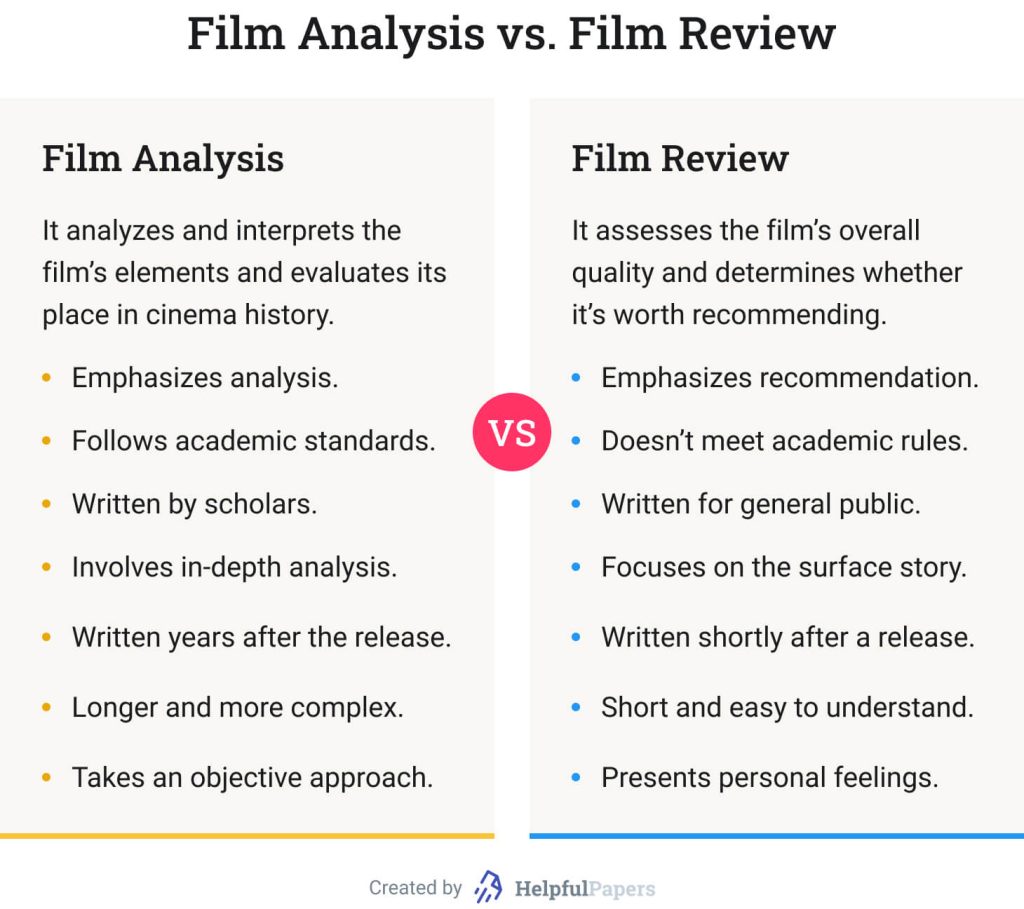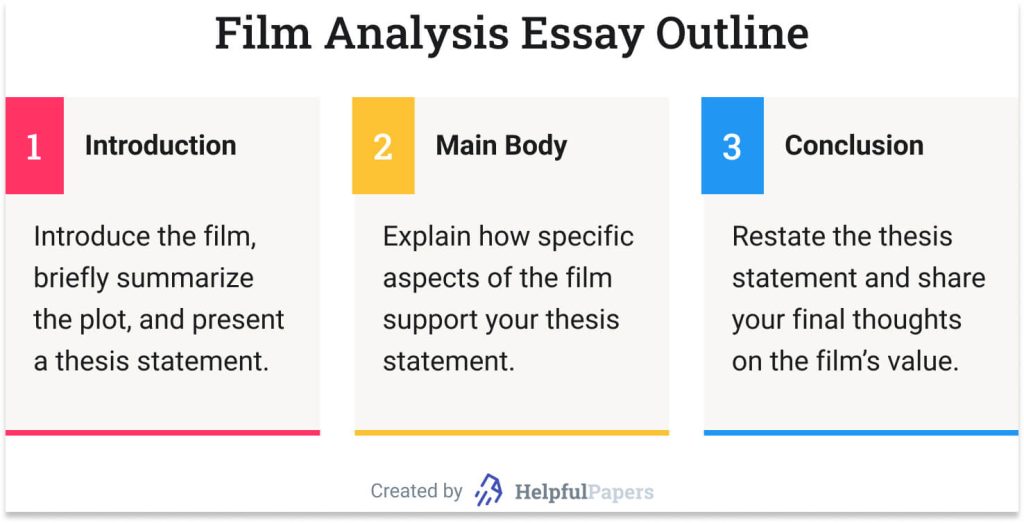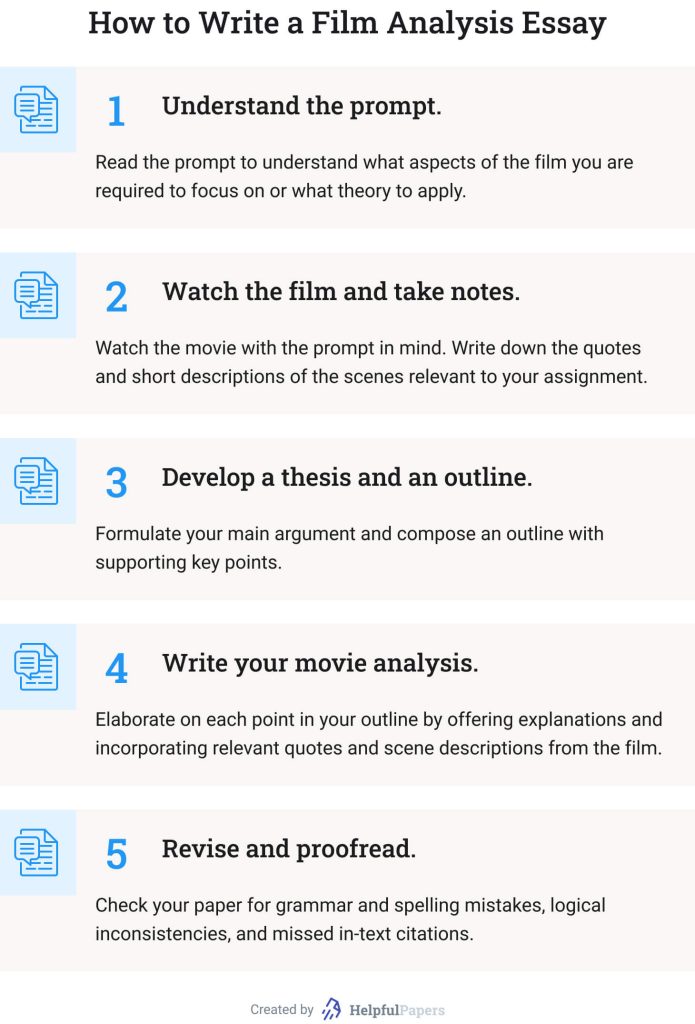
Films are never just films. Instead, they are influential works of art that can evoke a wide range of emotions, spark meaningful conversations, and provide insightful commentary on society and culture. As a student, you may be tasked with writing a film analysis essay, which requires you to delve deeper into the characters and themes. But where do you start?
In this article, our expert team has explored strategies for writing a successful film analysis essay. From prompts for this assignment to an excellent movie analysis example, we’ll provide you with everything you need to craft an insightful film analysis paper.
Table of ContentsA film analysis essay is a type of academic writing that critically examines a film, its themes, characters, and techniques used by the filmmaker. This essay aims to analyze the film’s meaning, message, and artistic elements and explain its cultural, social, and historical significance. It typically requires a writer to pay closer attention to aspects such as cinematography, editing, sound, and narrative structure.
It’s common to confuse a film analysis with a film review, though these are two different types of writing. A film analysis paper focuses on the film’s narrative, sound, editing, and other elements. This essay aims to explore the film’s themes, symbolism, and underlying messages and to provide an in-depth interpretation of the film.
On the other hand, a film review is a brief evaluation of a film that provides the writer’s overall opinion of the movie. It includes the story’s short summary, a description of the acting, direction, and technical aspects, and a recommendation on whether or not the movie is worth watching.

Wondering what you should focus on when writing a movie analysis essay? Here are four main types of film analysis. Check them out!

Many students experience writer’s block because they don’t know how to write an introduction for a film analysis. The truth is that the opening paragraph for a film analysis paper is similar to any other academic essay:
If you wonder how to write a thesis for a film analysis, we’ve got you! A thesis statement should clearly present your main idea related to the film and provide a roadmap for the rest of the essay. Your thesis should be specific, concise, and focused. In addition, it should be debatable so that others can present a contrasting point of view. Also, make sure it is supported with evidence from the film.
Let’s come up with a film analysis thesis example:
Through a feminist lens, Titanic is a story about Rose’s rebellion against traditional gender roles, showcasing her attempts to assert her autonomy and refusal to conform to societal expectations prevalent in the early 20th century.
Each body paragraph should focus on a specific aspect of the film that supports your main idea. These aspects include themes, characters, narrative devices, or cinematic techniques. You should also provide evidence from the film to support your analysis, such as quotes, scene descriptions, or specific visual or auditory elements.
Here are two things to avoid in body paragraphs:
In the conclusion of a movie analysis, restate the thesis statement to remind the reader of the main argument. Additionally, summarize the main points from the body to reinforce the key aspects of the film that were discussed. The conclusion should also provide a final thought or reflection on the film, tying together the analysis and presenting your perspective on its overall meaning.
Writing a film analysis essay can be challenging since it requires a deep understanding of the film, its themes, and its characters. However, with the right approach, you can create a compelling analysis that offers insight into the film’s meaning and impact. To help you, we’ve prepared a small guide.

When approaching a film analysis essay, it is crucial to understand the prompt provided by your professor. For example, suppose your professor asks you to analyze the film from the perspective of Marxist criticism or psychoanalytic film theory. In that case, it is essential to familiarize yourself with these approaches. This may involve studying these theories and identifying how they can be applied to the film.
If your professor did not provide specific guidelines, you will need to choose a film yourself and decide on the aspect you will explore. Whether it is the film’s themes, characters, cinematography, or social context, having a clear focus will help guide your analysis.
Keep your assignment prompt in mind when watching the film for your analysis. For example, if you are analyzing the film from a feminist perspective, you should pay attention to the portrayal of female characters, power dynamics, and gender roles within the film.
As you watch the movie, take notes on key moments, dialogues, and scenes relevant to your analysis. Additionally, keeping track of the timecodes of important scenes can be beneficial, as it allows you to quickly revisit specific moments in the film for further analysis.
Next, develop a thesis statement for your movie analysis. Identify the central argument or perspective you want to convey about the film. For example, you can focus on the film’s themes, characters, plot, cinematography, or other outstanding aspects. Your thesis statement should clearly present your stance and provide a preview of the points you will discuss in your analysis.
Having created a thesis, you can move on to the outline for an analysis. Write down all the arguments that can support your thesis, logically organize them, and then look for the supporting evidence in the movie.
When writing a film analysis paper, try to offer fresh and original ideas on the film that go beyond surface-level observations. If you need some inspiration, have a look at these thought-provoking questions:
To revise and proofread a film analysis essay, review the content for grammatical, spelling, and punctuation errors. Ensure the paper flows logically and each paragraph contributes to the overall analysis. Remember to double-check that you haven’t missed any in-text citations and have enough evidence and examples from the movie to support your arguments.
Consider seeking feedback from a peer or instructor to get an outside perspective on the essay. Another reader can provide valuable insights and suggestions for improvement.
Now that we’ve covered the essential aspects of a film analysis template, it’s time to choose a topic. Here are some prompts to help you select a film for your analysis.
Check out the Get Out film analysis essay we’ve prepared for college and high school students. We hope this movie analysis essay example will inspire you and help you understand the structure of this assignment better.
Get Out, released in 2017 and directed by Jordan Peele, is a culturally significant horror film that explores themes of racism, identity, and social commentary. The film follows Chris, a young African-American man, visiting his white girlfriend’s family for the weekend. This essay will analyze how, through its masterful storytelling, clever use of symbolism, and thought-provoking narrative, Get Out reveals the insidious nature of racism in modern America.
Throughout the movie, Chris’s character is subject to various types of microaggression and subtle forms of discrimination. These instances highlight the insidious nature of racism, showing how it can exist even in seemingly progressive environments. For example, during Chris’s visit to his white girlfriend’s family, the parents continuously make racially insensitive comments, expressing their admiration for black physical attributes and suggesting a fascination bordering on fetishization. This sheds light on some individuals’ objectification and exotification of black bodies.
Get Out also critiques the performative allyship of white liberals who claim to be accepting and supportive of the black community. It is evident in the character of Rose’s father, who proclaims: “I would have voted for Obama for a third term if I could” (Peele, 2017). However, the film exposes how this apparent acceptance can mask hidden prejudices and manipulation.
In conclusion, the film Get Out provides a searing critique of racial discrimination and white supremacy through its compelling narrative, brilliant performances, and skillful direction. By exploring the themes of the insidious nature of racism, fetishization, and performative allyship, Get Out not only entertains but also challenges viewers to reflect on their own biases.
Film analysis allows viewers to go beyond the surface level and delve into the deeper layers of a film’s narrative, themes, and technical aspects. It enables a critical examination that enhances appreciation and understanding of the film’s message, cultural significance, and artistic value. At the same time, writing a movie analysis essay can boost your critical thinking and ability to spot little details.
A critical analysis of a movie involves evaluating its elements, such as plot, themes, characters, and cinematography, and providing an informed opinion on its strengths and weaknesses. To write it, watch the movie attentively, take notes, develop a clear thesis statement, support arguments with evidence, and balance the positive and negative.
A psychological analysis of a movie examines characters’ motivations, behaviors, and emotional experiences. To write it, analyze the characters’ psychological development, their relationships, and the impact of psychological themes conveyed in the film. Support your analysis with psychological theories and evidence from the movie.